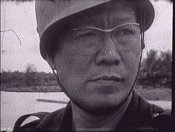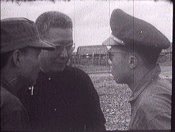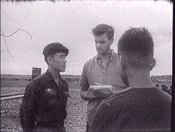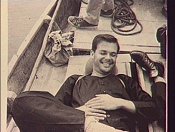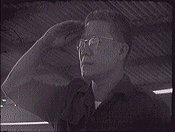 |  |  |  |  |
 | ||||
Stan Remembers: Father Hoa and his little army
Reporter: Stan Atkinson Photographers: KOVR 13 News, KCRA News As we head into the 21st century, worries about communism have taken a back seat to the threats of dictators and terrorists. But Stan Atkinson's career paralleled the "cold war." And when Stan met an extraordinary freedom fighter in 1962, he saw how hard some people were fighting against communism. Stan Atkinson: His name is father Nguyen Huac Hua. He's 53-years-old, a Chinese Catholic priest, guerilla fighter and the leader of Bien Hung.
For me, father Hoa's story personified the struggle against Communism. A Chinese guerilla leader against the Japanese in World War II, at war's end he was imprisoned twice by the Communists. And twice he escaped. His exodus from Communism sent the priest and his flock to North Vietnam, then Cambodia and finally to South Vietnam. There the Communists pushed them to the southernmost tip of the country. But Father Hoa dug in, determined to protect his people and their "free" way of life. And gradually he began winning the battle of "hearts and minds," constantly expanding his safe area of freedom. Eventually, he had liberated 400 square miles from Vietcong control and created a region that was secure and economically prosperous. Typical of the thousands who were beneficiaries of that was a young Communist prisoner that Father Hoa "converted."
Stan Atkinson / 1962: "Tai knew nothing about Communism, didn't care. Didn't want to join or fight with the Vietcong. But he lived in enemy territory. He was young, able, so he had no choice. Either fight or be punished by death. He fought as a Vietcong agent for three months, was captured in an ambush two miles from Bien Hung, carrying his homemade rifle. When he's released from Bien Hung, young Tai says he'll go back, get his family and bring them to live somewhere in the area inside the safe perimeter. Tai has learned fast how different life can be." And I got a memorable lesson in guerilla warfare. On a re-con mission like this, I was walking near the head of a column with father Hua's soldiers when someone gave me a mighty shove from behind. That push saved my life. There, right where I was going to step, a trip wire glistened in the light. Connected to a grenade, that wire could have made that one step my last. Happily, it's now a little souvenir at home. A reminder that not only life is precious, but that it works a lot better if you pay attention.
Father Hoa routinely traveled to villages outside Binh Hung to preach and to speak out against Communism. After covering a couple of these, my photographer and I began using that time to catch up on our sleep. I would climb inside a sampan to grab a few Z's. But one day, father Hoa preached longer than normal, and I ended up sleeping an hour and a half in the brutal mid-day sun. By that night, I was running a 103-degree temperature and sweating buckets. I thought I was going to die. Father Hua's communication's man relayed a message in Chinese to Saigon, where it was translated into Vietnamese. The message sent was: "the American named Atkinson in the village is seriously ill and may need a helicopter." But after translation, the message received was: "the American in the village is very seriously ill. He has Atkinson's disease!" Lucky for me, "Atkinson's disease" didn't prove fatal. All the hot tea they kept forcing me to drink finally broke the fever and I lived to talk about it.
The legacy of Father Hoa lived on as well. The Pentagon purchased 200 copies of the one-hour documentary I produced, using it as a training film for officers and non-coms being sent to the region. Over the years I have run into many men who remembered that film, Father Hoa and his little army. They were truly one of the only effective and victorious forces against the Viet cong. But as the political situation in Saigon got messier and corrupt, Father Hoa gave up his dream of freedom. Although his integrity was impeccable, increasing Vietcong propaganda was able to tie him to the bankrupt regime in Saigon. He saw the battle turning and little chance of winning. Discouraged, he left Binh Hung, and retired to a parish in Taipei. He died ten years ago. Still, in all my travels, as a man and a leader, my most unforgettable character. When I left Binh Hung, I asked Father Hoa what he wanted me to send him. I thought he might say first aid equipment or guns and ammo. But he asked for something to help him continue to win in the war for hearts and minds: 1,500 Disneyland t-shirts and some Coca-Cola billboards. I got them for him. From then on, the shirts were uniforms for all. The billboards flaunted Coke's availability in Father Hoa's free zone, but only if villagers would leave the Vietcong area and choose the priest's way of life. Back to top of the page Back to the Stan Atkinson page |
News Scripts News Team Question of the Day Sites & Links
Stan Remembers: Saddam out of control, Kuwait in flames Stan Remembers: On the road with LBJ Stan Remembers: Way news is covered has changed since the Donner Ridge forest fire Stan Remembers: 1977 Cuba a mixture of heaven and hell Stan Remembers: Vietnam and BT Collins, fates intertwined Stan Remembers: Dangerous days covering El Salvador Stan Remembers: The tragedy in Cambodia Stan Remembers: Sometimes covering the news risks your safety
6 am Daybreak News at Noon News at 5:00 News at 6:00 THE 10:00 News Saturday 5:00 Saturday 11:00 Sunday 6:30 Sunday 11:00 |
 | ||||
